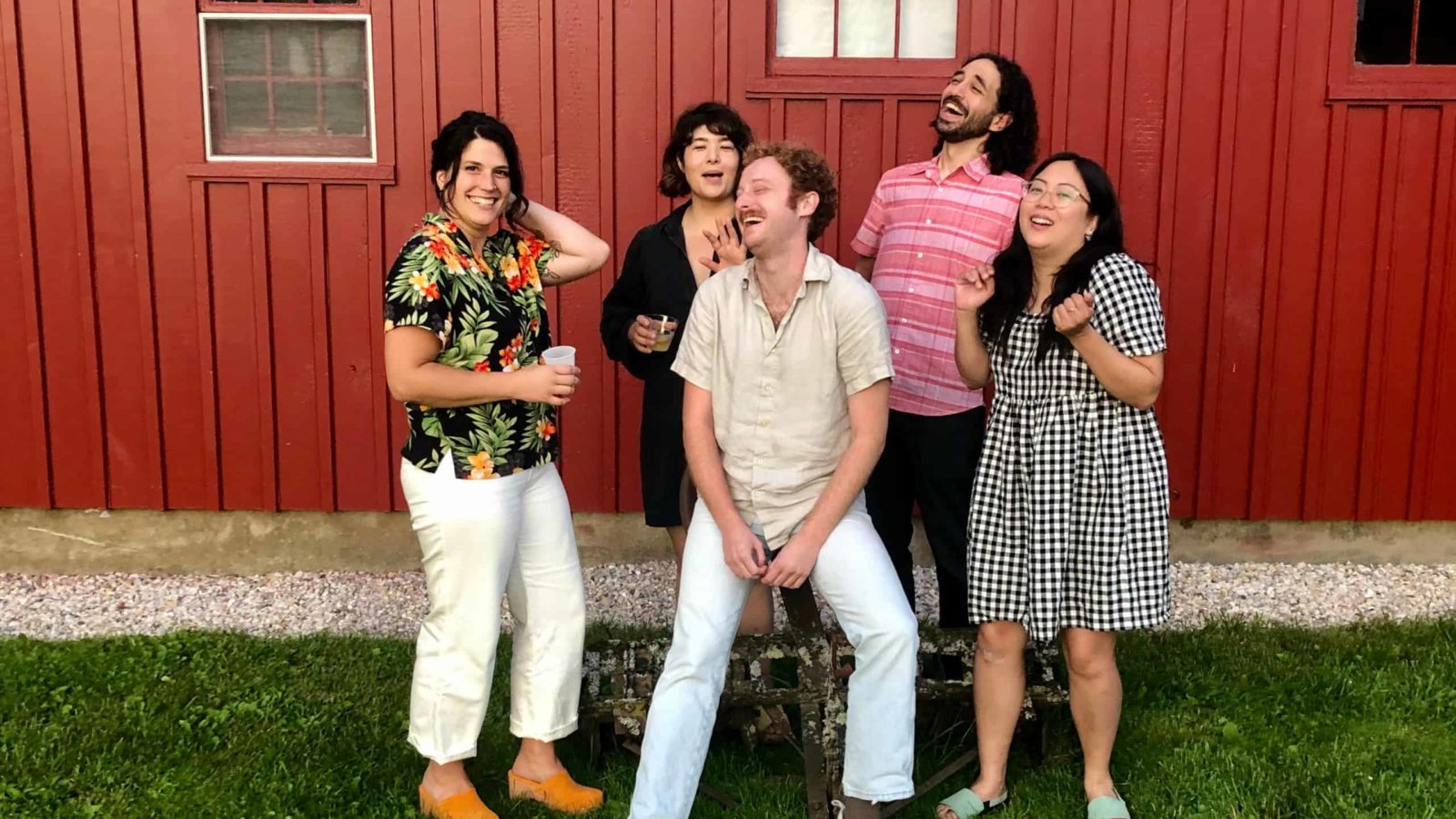Four poets and a playwright read to an intimate audience at Melville’s Arrowhead on the first evening of clear skies after the endless rain and clouds of early July. The green fields and forest were glowing around the old red barn as the writers stood in the doorway. Each read some of their work from the previous two weeks they had spent in a studio on the Arrowhead meadows and hills.
All five writers had spent two weeks in the Berkshires in The Mastheads July Writers’ Residency — each year since in 2016 (with a break in the pandemic) the Mastheads bring five emerging writers from across the country to live and work in Pittsfield. The writers work in five Masthead studios during the day, and this summer they were bunking at Miss Hall’s boarding school nearby at night.
This summer, five writers have come for a condensed residency — poets Helene Achanzar, Christine Larusso, Amanda Smeltz and Keith S. Wilson, and the playwright Sam Mayer. They came from across country: Chicago, Los Angeles, Houston and New York City.
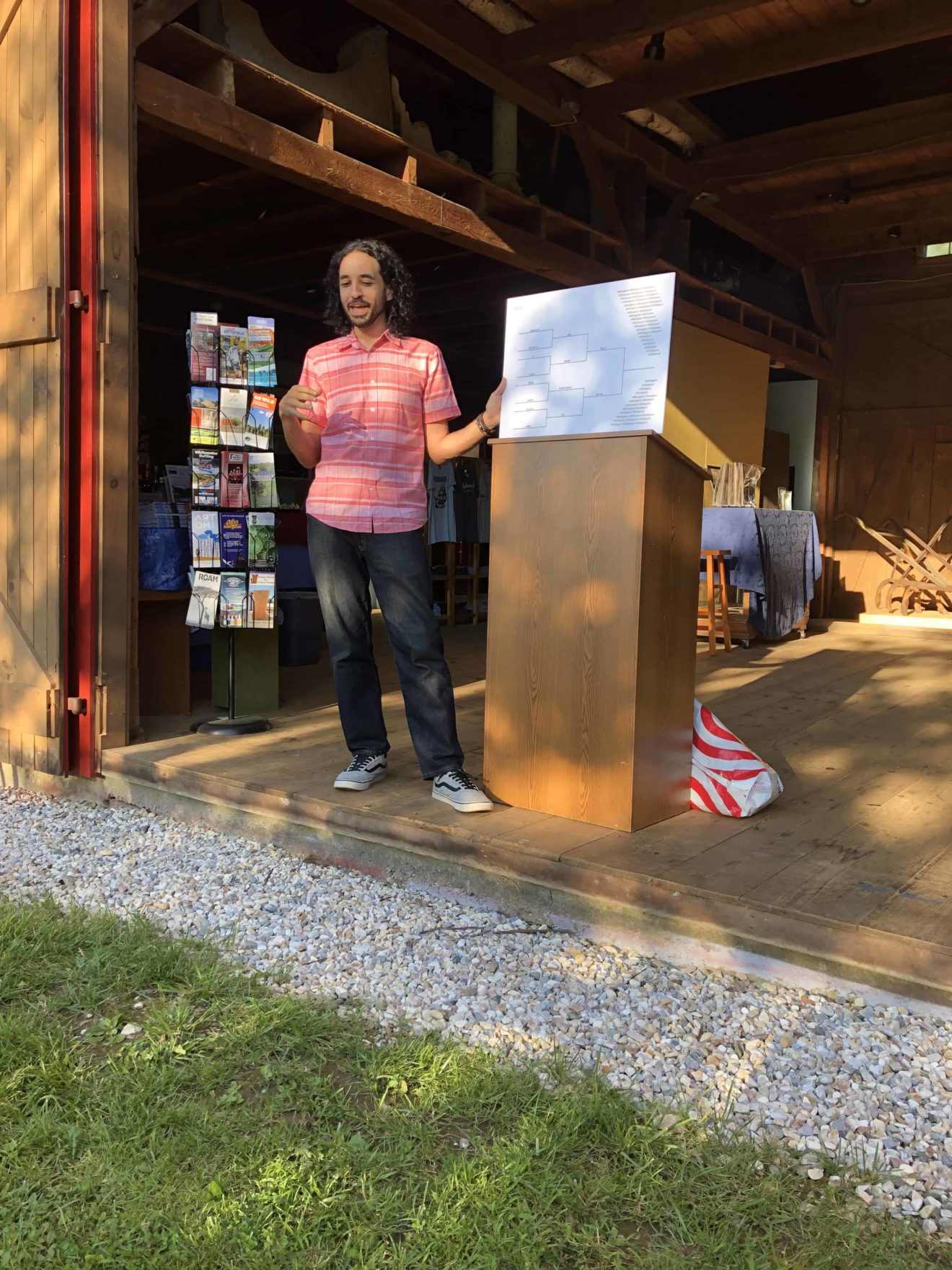
Poet Keith Wilson shares a visual poem with the audience.
Achanzar first spoke about travel. It can make a place memorable, she said, when experiences she has there relate directly to the political climate we’re in. She opened with a poem about a trip to Marfa on the Mexican border, where she had to “keep her accent to herself” and navigate “sunstroked in a courtyard of statement sandals.”
“The sun set and I drove up a mountain / to let the cosmos peer through, trying to make sense / of the vexed and over-glossed world below …”
Her poem tangled identity, capitalism and place as she balanced her comfort in easy cosmopolitan wonders with the pain she sees in the lives of people she meets there.
She returned to Marfa in a second work, trying to take in difficult days along the Rio Grande — border guards, deeply polluted water, the family who “fed her in Spanish” and the man who let her ride his burro back toward home.
A Filipina Canadian poet and educator now living in Chicago. She is an associate editor for Poetry Northwest, the regional chair for Kundiman Midwest, and the programs manager at the Chicago Poetry Center.
She thanked The Mastheads for the time and space to think and write and for the community she found here.
“It’s wonderful to gather with poets from all over the country,” she said.
‘It’s wonderful to gather with poets from all over the country,”
Each resident worked in one of the five Masthead open-air studios, all of them open to the outdoors in the fields at Arrowhead. Mastheads co-founder Tessa Kelly designed five mobile studios, each inspired by one of the five American Renaissance authors and the places where they wrote in the Berkshires: Herman Melville’s end-gable study, Nathaniel Hawthorne’s attic roof valley, Henry Wadsworth Longfellow’s stairwell, Oliver Holmes’s nesting boxes, and Henry David Thoreau’s observation tower.
These studios on wheels are often scattered during the year, across Pittsfield’s urban areas, cultural venues from Mass MoCA to Hancock Shaker Village, outdoors from Canoe Meadows to Onota Lake. This summer, all five studios came here to Melville’s historic house and farm.
At the reading, the writers celebrated the work they have created here, in a lively event warmed by a golden sunset and drinks in the barn as members of the community sat to talk writing and hear the residents read.
“The Berkshires is not familiar to me,” Achanzar said in the reading. “I am moved by the mountains.”
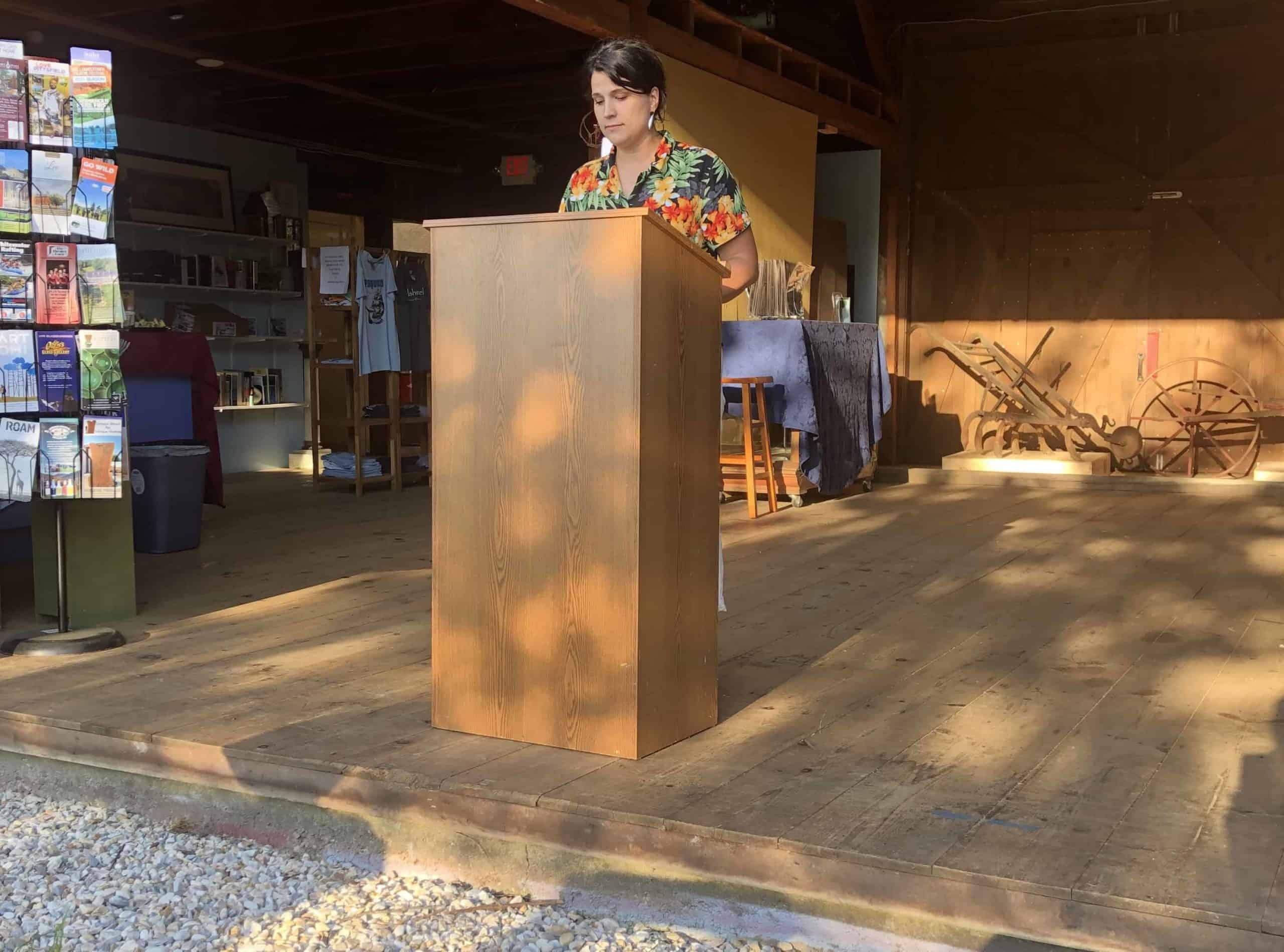
Amanda Smeltz read her unique poem "Gas Station Hotdog" as the audience laughed along with her.
She felt thankful for this gift of time, community and privacy. She spoke fondly of the friendships and community of the Residency.
In one poem she recalled evenings with fellow poet Amanda Smeltz, watching Crash Landing on You, a passionate South Korean romantic drama, and she remembered trips with her fellow writers … “the part of you that laughs when I laugh … You listened hard on my love of lighthouses and drove me far to watch a beam shine on me in the dark.”
She found it powerful, she said after the reading, to stand at the summit with the lighthouse far from the ocean, now a memorial for people who died in the First World War.
‘I am moved by the mountains.’ — Helene Achanzar.
The Berkshires has brought her different experiences in this short time. In a new poem, she described a visit to the Clark Art Institute. She was standing, looking at Jean-Léon Gérôme’s painting, ‘the Slave Market’ — and a man walked up to her, standing too close, and asked her if she thought someone might want to destroy it. She looked at the image of three men examining a naked woman, one man putting two fingers to her mouth — and said yes.
Her fellow poet Keith Wilson also recalls the Clark, in a different way. He is thinking, he told the group, of creating a website where he could show specific poems at certain times of day — so a poem might appear only at dusk, or at dawn. Some of that idea came to him in the Clark’s summer show of Norwegian artist Nikolai Astrop’s paintings, he said after the reading.
Astrop created his own wood block prints, inspired by Japanese painters and printmakers, and he would create several prints from the same block, sometimes in very different light. The same lake shore could gleam at noon or ripple in shadow in the moonlight. That changing time intrigued Wilson … he also thought of ragas, classical Indian themes, modes, melodic and harmonic patterns of music meant to be played at specific times of day and year.
“It’s a form impossible to translate into something else,” he said — “Take it away from the season or when it’s intended to be translated and you lose something. Poetry hasn’t often had that.”
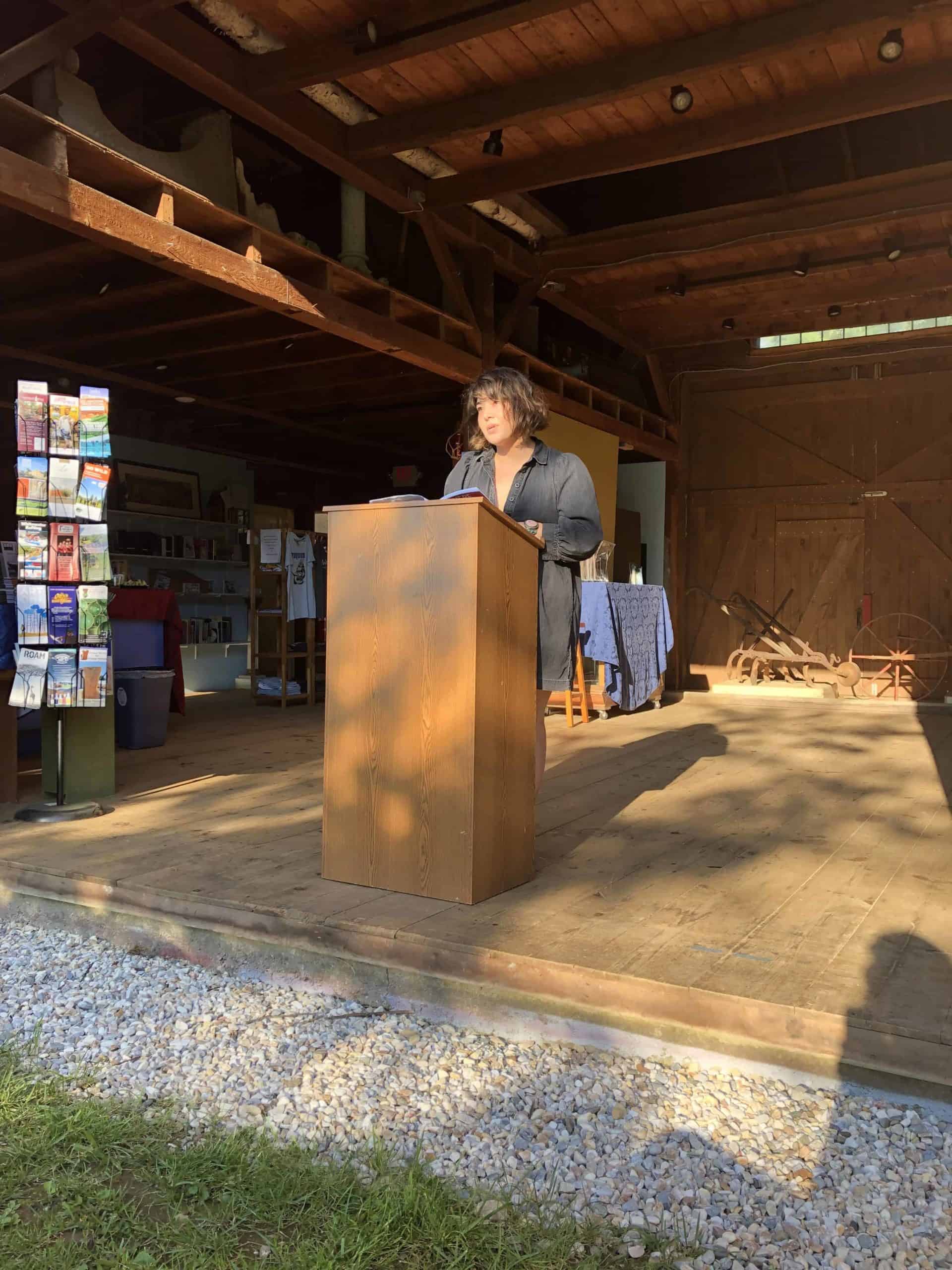
Poet Christine Larusso comments shares poems of the past and of the future with the audience.
Wilson is both a nationally known poet and a game designer, an Affrilachian Poet and a Cave Canem fellow. The New York Times recognized his first book, Fieldnotes on Ordinary Love, as a best new book of poetry.
Reading here in the barn doorway, in the evening light, he began by sharing the “visual poetry” he had focused on while in the studio. He has created a movie flipbook, an infinite loop that spins with the turn of a handle. The pages show a phrase by poet Rita Dove: “Shy mulatto wanders toward my heart.”
“I wanted to take a line from a poem I love and examine the idea of seeing myself in her work,” he said, “and reading it over and over again.”
He wanted to make something animated that was connected to the body, that someone could play with, he said, and identify with.
“We’re reading for experience,” he said. “When you’re reading fantasy, you may not see yourself as an elf, but you’re drawn to the stories and the friendships you see there.”
As the visual poems circulated, he read work aloud.
‘I wanted to take a line from a poem I love and examine the idea of seeing myself in her work and reading it over and over again.’ — Keith Wilson
Under the old spruce and pine trees, he thought about the distinctiveness between species of trees and about individuality. “Today I’ll know there are differences in them — some kind of ash, a box elder ….” Surrounded by forests, he may see the green in a blur — “I notice no variations, not ginko or dogwood … do you think God bothers to learn all our names?”
He considers what it means to see and recognize a plant or a person, a tree “bent like my father for a penny,” as he recognizes the unique life of each tree in the wooded landscape.
In his time here, he has focused on visual poems – poems a reader has to see as well as read.
“I love when form is impossible to translate into something else,” Wilson said.
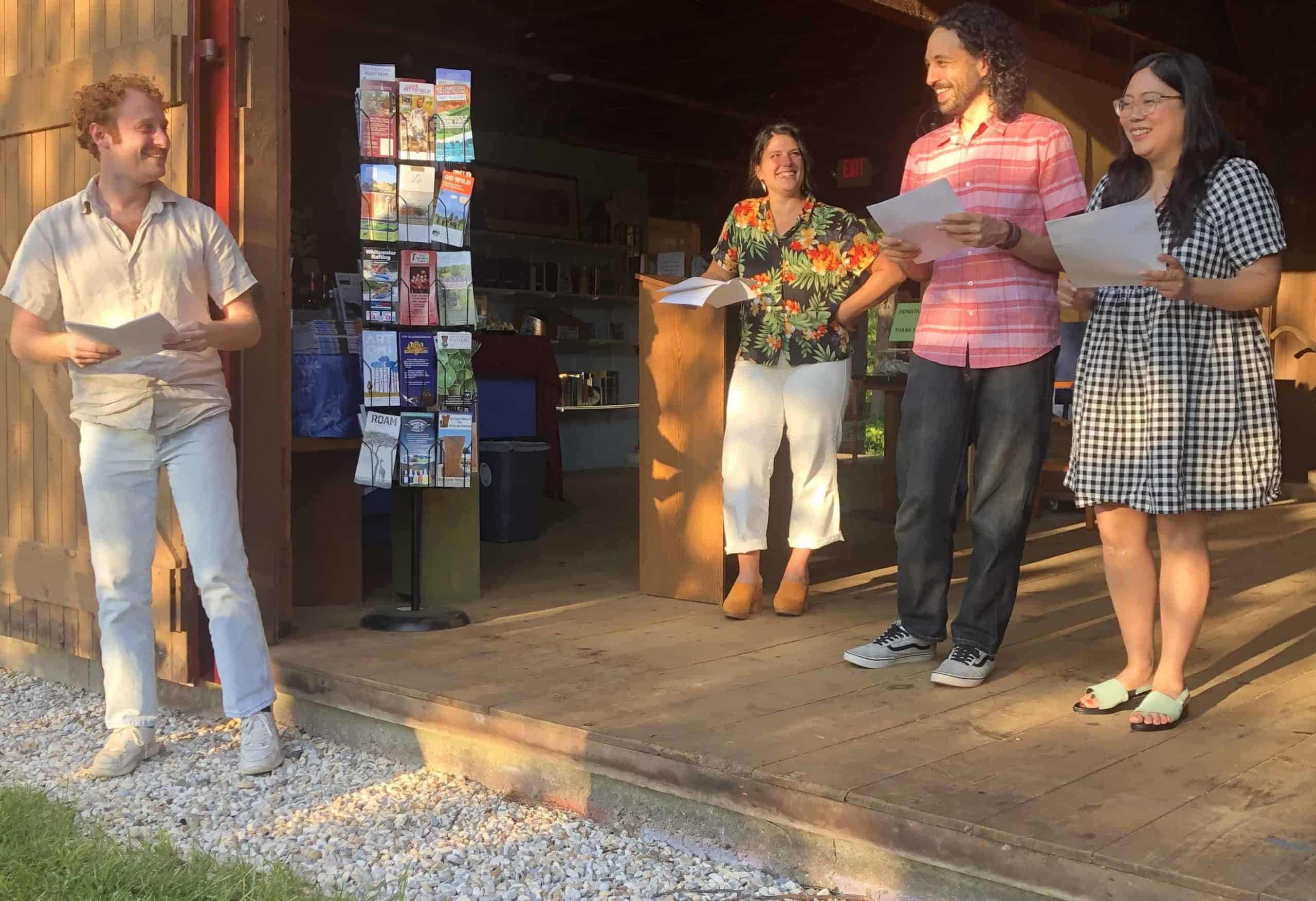
Playwright Sam Mayer narrated as his fellow residents performed part of his play.
“Underdog” takes the form of a Venn diagram, overlapping loops with a word or parts of words in each intersection. Flame colors backwash diagram, vivid oranges and yellows of different transparencies, and readers can join words and across the page in countless ways. This poem prompts readers to make their own connections across the words and intersections.
“You may see things I haven’t thought of,” Wilson said. In the environment of a curated experience, there are some combinations you’re likely to see, religious imagery, but it’s such an open form. I can’t read it out loud.”
He reflected on light and color in his third visual poem. In photography, light is additive, he explained, and America has used the symbol of light as hope and progress. America has also used the symbol of light as the opposite of Blackness, Wilson said, as he commented on the racialized language he sees as all too prevalent in America.
This poem takes the form of a flow chart, like a diagrammed sentence. He starts with words for different shades, many of them dark, grey, brown — ash, chestnut … — and he keeps reducing them, until the colors and the ideas they embody become muddied and stark.
Choosing the words and letters, he was considering how often competition reduces complexity — like sports teams competing to move onto the next round, shrinking the group each time, marginalized people are pitted against each other in moments of opportunity, such as when a film only casts one Black character.
Like Wilson, New York poet and wine sommelier Amanda Smeltz, was inspired by what she saw outside the square window of the Longfellow studio. Smeltz, author of poetry collection Imperial Bender, described the quiet and calming containment that writing in a studio gave her.
“I wrote a lot,” Smeltz said, finding her time in the studio quiet and productive: “The bright woods inside and the slices of light from the window give it a glowing feel. There is a really interesting sense of being both inside and outside.”
She found the studio comfortably small, not stifling. As she spent her time outside the studio, walking in the meadow, she said, she became drawn to the Queen Anne’s Lace flowers that inhabit the meadow around her studio. She learned that they have many traditional uses in healing.
‘The bright woods inside and the slices of light from the window give it a glowing feel. There is a really interesting sense of being both inside and outside.’ — Anamda Smeltz
“We often assign a benign and sympathetic quality to the plant,” she said, and with their soft and delicate makeup, the plant is powerful and can be used for abortions. Smeltz spent time staring into the red dot in the middle of Queen Anne’s Lace, and she wrote about the symbolic significance of the captivatingly complicated flower.
In the studio within the meadow of these white wildflowers, she also spent time thinking about her father.
“It is easy to be maudlin, dorky and sentimental when thinking about a dad,” she said, “but I tried to push myself out of that.”
In a poem about her father, “Gas Station Hotdog,” she wrote in an unnamed Welsh nature form she has practiced before. The form has thee-line stanzas and a flowing rhyme scheme in which rhymes balance across different stanzas and the first line repats over and over. The traditional form often take a natural image for the repeating word, a plant or a flower. Smeltz chose a comfort food from her childhood, a treat from weekend dtips to ball games — “Gas station hotdog” repeats as a refrain, 14 times.
In the poem, she reflected on subtle care from her father when she was young and introduced his intricate sternness that molded their relationship.
When Christine Larusso read, she too reflected on her past relationships. She is a Los Angeles poet with work in many publications such as Wildness and The Literary Review, and her first book There Will Be No More Daughters traverses experiences in a multiracial family, patriarchy, inherited history and identity.
She began with poems from the past. “Love is a sedimentary rock with waves washing over,” she read. Mark Rothco paintings and minimalism came into her work, and with a Rothco-like painterly blurring she blended descriptions of paintings into her own life experiences.
In her last poem on the past Colonial Love Song, she spoke of a “gun at her head” and a “maze she had to follow.” The poem complicated the American dream with the colonizing force of men. “I looked for a trigger,” the last line read.
Larusso then read a suite of poems “from the future.” She warned the audience of the climate crisis and a potential world without the natural environment familiar to them. This new world would feel like a simulation, with “simulated sunburns” and “rations sent” to the public. “The Fairytale writers thought they had fixed the future …”
Playwright Sam Mayer of Houston was the last to share, and he reflected on youth and adolescence as he read.
Mayer first read the script for a trailer for poolboy00, a reality show on his own life that functions as an interactive memoir. He performs the show in clips and live streams on the streaming platform Twitch.
Mayer then had his fellow residents join him to act out scenes from his play, Chet’s Summer Vacation. The play centers on a young boy that experiences a sexual awakening after falling in love with his air conditioner. The four poets each had a different role as Mayer narrated, and Larusso even personified the air conditioner.
The suggestive comedy sparked laughter in the audience and stood as a surprising compliment to the more sobered and serious poems of the writers prior. The camaraderie between the residents was apparent as they helped Mayer present his play.
“I can’t emphasize enough how wonderful it is together here,” Achanzar said.
The reading was an all-encompassing glimpse into their two weeks in the Berkshires. The residents expressed warmth for their ability to learn from each other and for the time spent in the studios. Between quiet days in the studio and field trips up Mount Greylock, they brought their experiences into the writing they shared.
They have much ahead as well. They shared future plans of innovative visual poems from Wilson and a new tech-savvy reality show from Mayer before they spread back out across the country.

